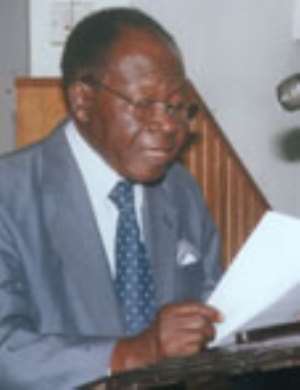
Mr. K. B. Asante, retired Diplomat and former Minister under the Jerry Rawlings regime, has urged the government not to see the meagre successes chalked in good governance as trophies for which it (the government) should be applauded, saying that, good governance was a must for the development of this nation.
“We must come off the idea that in striving for good governance we are performing for the international community to applaud us because good governance is not an event but the life blood of our future as a nation,” he said.
He was speaking at a governance forum, organised by the Ghana Chapter of the Hubert H. Humphrey Fellowship Program Alumni Association (HHF-Ghana), which has a group of scholars who have had the privilege of undertaking various leadership courses in different universities across the United States of America.
The forum, under the theme; Excellence in Governance: Africa's Future Depends Upon it – The case of Ghana at 50, was to address issues of good governance at the national, public/civil service, academic and corporate levels.
Mr. Asante said though Ghanaians were generally nice people, “our attitude towards good governance over the past 50 years has not helped this country to achieve good governance.”
He explained that even though Ghanaians professed freedom and justice, they often preferred peace to seeing justice through to its logical conclusion.
Also at the forum Mr. Frank Ocran, Executive Chairman of the State Enterprises Commission said at the civil and public service level, people usually related to their superiors as parents, referring to them as mum or dad, and that made it difficult for people to be penalized even when they broke the law at the workplace.
Touching on bribery and corruption, he said whereas in the private sector the decision to give bribes to public sector officers was taken at board meetings, those who benefit from bribery in the public service receive the bribes privately.
“To ensure good governance devoid of corruption in particular, it would have to take more than just the public sector – people in the private sector must first decide not to give bribes and that will just stop public sector workers from expecting bribes,” he said.
Mrs. Elizabeth Joyce Villars, Chief Executive of Camelot also called on corporate Ghana to forge a close relationship with the media to ensure that the media was in the know of good corporate governance activities in order to assist the growth of corporate Ghana.
The high point of the programme was when the Vice President Alhaji Aliu Mahama delivered an address on the challenges to Ghana's development agenda over the past 50 years. He observed that “our national vision of freedom, justice and wealth creation remain relevant over the next 50 years if we infuse the national psyche with discipline.
“With a culture of discipline for development, I believe we can raise productivity and national growth rate by over two per cent annually at the present day levels of resource mobilization and investment,” he said.
Alhaji Mahama, who is himself a patron of HHF-Ghana, noted that since independence, public and private sector leadership in Ghana had not lacked the necessary ideas and plans to order the affairs of the country, but indiscipline and irresponsible approach to leadership had robbed this country of the benefits of freedom.
“Right after independence, a lack of responsibility in enforcing the intent and vision enshrined in our national symbols led to inconsistent governance…the result was the loss of policy direction that culminated into poor institutional growth,” he said.
He said the high level of poverty in Ghana today, after 50 years of independence was largely due to general indiscipline and irresponsible approach to leadership and governance.
Alhaji Mahama said the poverty in which Ghana found itself long after independence could be attributed to leadership inability to assume the responsibility needed to realize the true benefits of freedom and also said that “the bane of our lack of progress is indiscipline and entrenched culture of impunity.”
He therefore suggested that the national desire for development in freedom must necessarily be balanced by the need for a responsible approach to leadership and public policy management at the individual, community and national level.
The Vice President noted that effective leadership responsibility required discipline, saying that even though freedom was priceless the benefits of it were not free.
“If freedom means the right of choice, discipline implies the duty to be accountable for the choices made”.
The Vice President therefore, challenged the 88 members of HHF-Ghana to strive and make a difference as Ghana looked for the most viable way out of poverty for the majority of citizens.




 Critics fear Togo reforms leave little room for change in election
Critics fear Togo reforms leave little room for change in election
 Flooding: Obey weather warnings – NADMO to general public
Flooding: Obey weather warnings – NADMO to general public
 Fire in NDC over boycott of Ejisu by-election
Fire in NDC over boycott of Ejisu by-election
 NDC to outdoor Prof Jane Naana Opoku-Agyemang as running mate today
NDC to outdoor Prof Jane Naana Opoku-Agyemang as running mate today
 Ejisu: CPP seeks injunction to stop April 30 by-election
Ejisu: CPP seeks injunction to stop April 30 by-election
 Dismiss ECG, GWCL, GACL bosses over losses – United Voices for Change tells gov’...
Dismiss ECG, GWCL, GACL bosses over losses – United Voices for Change tells gov’...
 Submit 2023 audited financial statements by May – Akufo-Addo order SOEs
Submit 2023 audited financial statements by May – Akufo-Addo order SOEs
 Current power outages purely due to mismanagement – Minority
Current power outages purely due to mismanagement – Minority
 ECG hoists red flag to fight Ashanti Regional Minister over arrest of General Ma...
ECG hoists red flag to fight Ashanti Regional Minister over arrest of General Ma...
 Mahama’s 24hr economy will help stabilise the cedi; it’s the best sellable polic...
Mahama’s 24hr economy will help stabilise the cedi; it’s the best sellable polic...
